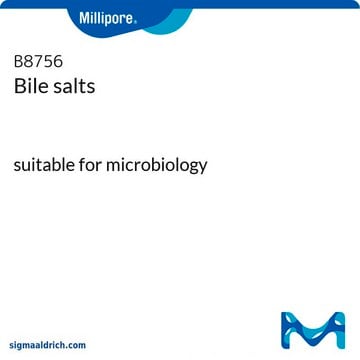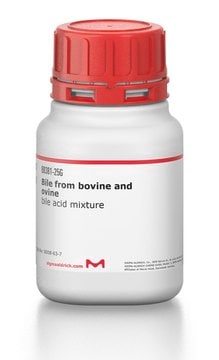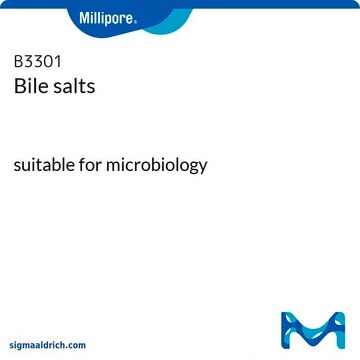B3426
Bile salts mixture
suitable for microbiology
Sinonimo/i:
Bile acids sodium salt, cholic acid-deoxycholic acid sodium salt mixture
About This Item
Prodotti consigliati
Sterilità
non-sterile
Livello qualitativo
Forma fisica
powder
Confezionamento
pkg of 100 g
Perdita
≤6% loss on drying
Colore
yellow to brownish-yellow
pH
7±0.5
Solubilità
distilled water: freely soluble
applicazioni
microbiology
Temperatura di conservazione
10-30°C
Descrizione generale
Applicazioni
Nota sulla preparazione
Indicazioni di pericolo
Consigli di prudenza
Classi di pericolo
Aquatic Chronic 3
Codice della classe di stoccaggio
11 - Combustible Solids
Classe di pericolosità dell'acqua (WGK)
WGK 2
Punto d’infiammabilità (°F)
Not applicable
Punto d’infiammabilità (°C)
Not applicable
Choose from one of the most recent versions:
Possiedi già questo prodotto?
I documenti relativi ai prodotti acquistati recentemente sono disponibili nell’Archivio dei documenti.
I clienti hanno visto anche
Articoli
Probiotics exhibit an inhibitory effect on pathogens, help prevent chronic intestinal inflammatory diseases or atopic syndromes, and support the immune system.
Il team dei nostri ricercatori vanta grande esperienza in tutte le aree della ricerca quali Life Science, scienza dei materiali, sintesi chimica, cromatografia, discipline analitiche, ecc..
Contatta l'Assistenza Tecnica.














